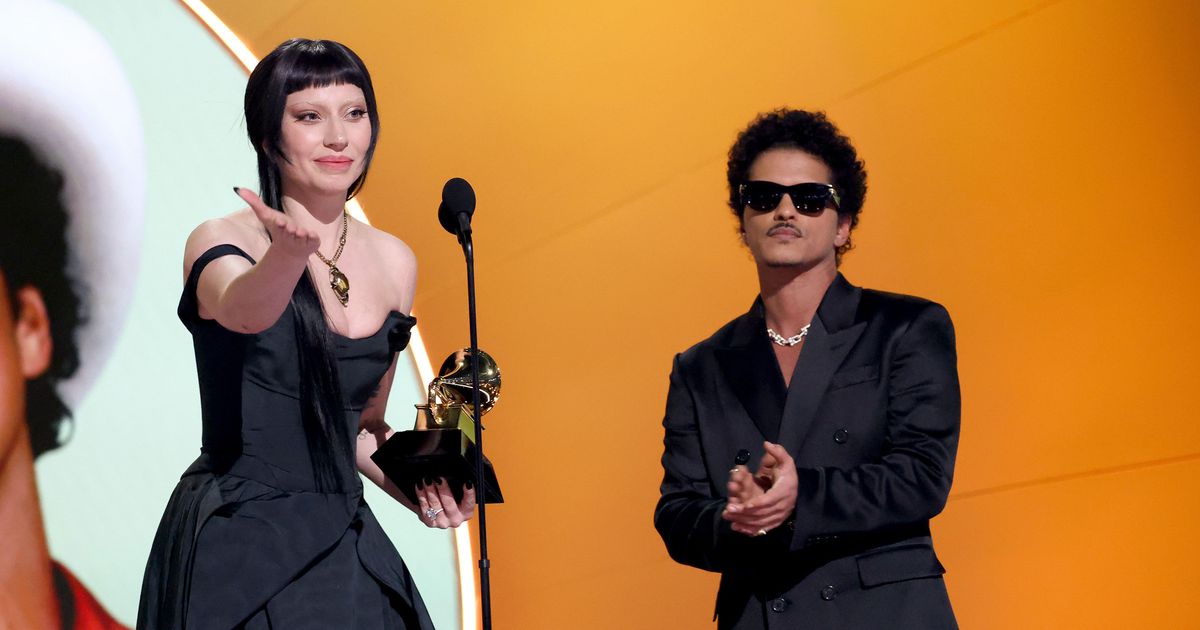The 2025 Grammys Were a Little Too Feel-Good
Mainstream music seems to see itself as a refuge from real-world trolls.


Thousands of protesters took to the streets of Downtown Los Angeles Sunday afternoon and evening, touting American, Mexican, and Honduran flags and creating gridlock along the 101 in protest of a storm of ICE deportations. The signing of the Laken Riley Act, which pushes detention as a consequence for a shoplifting arrest, and the planned expansion of migrant detention centers, dovetails with a rapid unfurling of paths to citizenship, the dissolution of funding for diversity initiatives, and a growing raft of de facto federal challenges to queer, nonbinary, and trans personhood.
But the tone inside the Crypto.com Arena blocks away never matched the traffic-stopping urgency. The Grammys broadcast was instead steeped in a desire to help L.A. rebuild and honor the city’s contributions to culture, from the opening cover of Randy Newman’s “I Love L.A.” performed by an all-star cast led by roots rockers Dawes to Compton rapper Kendrick Lamar’s five wins for “Not Like Us.” While the show put its star power to noble use, fundraising for wildfire victims like an old-school telethon and placing celebs in ads for local businesses, it felt most prepared to address the one issue. Yes, Trevor Noah made sure to talk immigration policy, joking that we may be watching his final gig in the States, but he presented more as the affable, celeb-roasting repeat Grammy host of recent years than the Daily Show snarker circumstances necessitated. (Steve Harvey would’ve yakked more billionaire wallets open.) Particulars about the other pressing political threats to artists’ livelihoods weren’t always spelled out so clearly.
The evening was littered with moments of heartwarming advocacy that sometimes felt like a mirror on the nascent Drumpf-era mood of the 2017 ceremony, the Grammys’ last bout with fear of a post-inauguration political crackdown, where Katy Perry performed “Chained to the Rhythm” sporting a “RESIST” armband. To be fair, there was plenty of wisdom and beauty in letting the vastness of the American musical landscape do a lot of talking; this instinct was most visible in songwriter, producer, and activist Justin Tranter’s peppy premiere ceremony-hosting gig, which often introduced guests as “fellow homosexuals.” But the stresses outside bled into the proper show at a trickle, largely via loving words. “DEI is a gift,” Alicia Keys said while accepting the Dr. Dre Global Impact Award (whose chance for a less nose-crinkling name seems all but dashed). Shakira dedicated a Best Latin Pop Album trophy to “true sheroes” and “immigrant brothers and sisters,” pledging to fight with them. Lady Gaga gave a pointed, emotional address in her acceptance speech for Best Pop Duo/Group Performance, which the conquering Bruno Mars duet “Die With a Smile” inarguably earned. “Trans people are not invisible,” she said. “Trans people deserve love. The queer community deserves to be lifted up.” Yet the sources of the problems were never named. You didn’t hear the president’s name. The sense that everyone gets what’s making everyone upset itched. Janelle Monáe landed the most direct snap with an after-party freestyle calling Nelly a sellout for playing the inauguration. But there was so very little shit talked at the Grammys that awarded one of history’s rudest diss tracks five times over.
These missives (and bits of brightness earlier in the day like Chappell Roan on the red carpet honoring “all the queer midwestern kids”) made you wonder why more big show presenters and performers didn’t make similarly gutted appeals. The vibe was a little too feel-good, too apprehensively 2017 when a dip in the spirit of the 2018 Grammys — home to Kesha’s support-group “Praying” performance, a country tribute to Las Vegas shooting victims, and percussive politics from DAMN.-era Kendrick — was in order. Watching Stevie Wonder and Herbie Hancock play a bit of “We Are the World” last night opened a window into the 20th-century relationship between the tone of the times and the text of the major-label music being sold back to it. Heartland rock, grunge, soul, punk, and gospel could address failings in prevailing social mores alongside matters of the mind and heart. Too much mainstream music now sees itself as a refuge from real-world toils. The shift feels pronounced since the COVID vaccine defibrillated the music business. But evaporating government protections and economic instability are soon to come careening into an already precarious season of industry. Pop doesn’t have to be cotton candy. Integrated communities swirling with vital queer nightlife — which produce, influence, and support pop stars — are in pronounced danger. The outreach doesn’t need to pattern itself after past cringe but must start carrying itself like its surrounding ecosystems could dry up with baffling speed and cruelty.
Related








